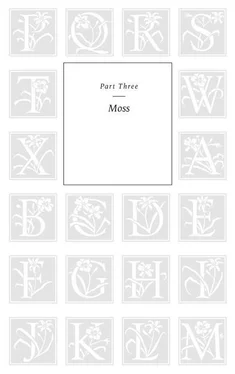Vanessa Diffenbaugh - The Language of Flowers
Здесь есть возможность читать онлайн «Vanessa Diffenbaugh - The Language of Flowers» весь текст электронной книги совершенно бесплатно (целиком полную версию без сокращений). В некоторых случаях можно слушать аудио, скачать через торрент в формате fb2 и присутствует краткое содержание. Жанр: Старинная литература, на английском языке. Описание произведения, (предисловие) а так же отзывы посетителей доступны на портале библиотеки ЛибКат.
- Название:The Language of Flowers
- Автор:
- Жанр:
- Год:неизвестен
- ISBN:нет данных
- Рейтинг книги:4 / 5. Голосов: 1
-
Избранное:Добавить в избранное
- Отзывы:
-
Ваша оценка:
- 80
- 1
- 2
- 3
- 4
- 5
The Language of Flowers: краткое содержание, описание и аннотация
Предлагаем к чтению аннотацию, описание, краткое содержание или предисловие (зависит от того, что написал сам автор книги «The Language of Flowers»). Если вы не нашли необходимую информацию о книге — напишите в комментариях, мы постараемся отыскать её.
The Language of Flowers — читать онлайн бесплатно полную книгу (весь текст) целиком
Ниже представлен текст книги, разбитый по страницам. Система сохранения места последней прочитанной страницы, позволяет с удобством читать онлайн бесплатно книгу «The Language of Flowers», без необходимости каждый раз заново искать на чём Вы остановились. Поставьте закладку, и сможете в любой момент перейти на страницу, на которой закончили чтение.
Интервал:
Закладка:
Grant looked up. He checked his own watch and then looked out the window. It was still raining. “You want to go home?”
The roads were wet; the drive would be slow. I would get soaked in the two blocks between Bloom and the blue room, and Natalya’s band would be practicing. Renata did not expect me at work the following day. No, I realized, I did not particularly want to go home.
“Do I have another choice?” I asked. “I’m not sleeping here with you.”
“I won’t stay here. You can have my bed. Or sleep on the couch. Or wherever.”
“How do I know you won’t come back in the middle of the night?”
Grant pulled his keys out of his pocket and detached the key to the water tower. He handed it to me and walked down the stairs. I followed him out.
In the kitchen he grabbed a flashlight out of a drawer and a flannel jacket off a hook. I opened the door, and he walked out, lingering under the cover of the stoop. Rain ran in sheets around the protected step. “Good night,” he said.
“Spare key?” I asked.
Grant sighed and shook his head, but he was smiling. He leaned over and picked up a rusted watering can, half full of rainwater. He poured the water through the spout as if he was watering the sodden gravel. In the bottom was a key. “It’s probably rusted beyond use. But here you go, just in case.” He handed me the key, and our hands clasped around the wet metal.
“Thanks,” I said. “Good night.” He stood still as I inched the door closed and turned the lock.
I breathed in the emptiness of the water tower and climbed the stairs. On the third floor, I pulled the blanket off Grant’s bed and returned to the kitchen, curling up underneath the picnic table. If the door opened, I would hear it.
But all I heard, all night, was the rain.
Grant knocked on the door at half past ten the next morning. I was still asleep under the table. It had been twelve hours, and my body was stiff and slow to rise. At the door I paused, leaning against the solid wood and rubbing my eyes, my cheekbones, and the back of my neck. I opened the door.
Grant stood in the clothes he’d worn the night before and looked only slightly more awake than I felt. Stumbling into the kitchen, he sat down at the table.
The storm had passed. Outside the window, under the cloudless sky, flowers glistened. It was a perfect day for photography.
“Farmers’ market?” he asked. “On Sundays I sell down the road instead of in the city. You want to come?”
December was a bad time of year for fruit and vegetables, I remembered. Oranges, apples, broccoli, kale. But even if it had been midsummer, I wouldn’t have wanted to go to the farmers’ market. I didn’t want to risk seeing Elizabeth. “Not really. I need film, though.”
“Come with me, then. You can wait in the truck while I sell what I have left over from yesterday. Then I’ll take you to the drugstore.”
Grant changed his clothes upstairs, and I brushed my teeth with toothpaste and my finger. Splashing water on my face and hair, I went to wait in the truck. When Grant joined me a few minutes later, he had shaved and put on a clean gray sweatshirt and only slightly dirty jeans. He still looked tired, and he pulled up his hood as he locked the door of the water tower.
The road had flooded in places, and Grant drove slowly, his truck swaying like a boat in deep water. I closed my eyes.
Less than five minutes later, he stopped the truck, and when I opened my eyes, we were in a crowded parking lot. I slunk down in my seat while Grant jumped out. Pulling his hood low over his forehead, Grant slid the buckets out of his truck. I closed my eyes and pressed my ear against the locked door, trying not to hear the noises of the busy market or remember the many times I’d been there as a child. Finally, he returned.
“Ready?” he asked.
Grant drove to the nearest store, a country drugstore with fishing gear and pharmaceuticals. Being out in the world, in such close proximity to Elizabeth, made me nervous.
I paused, my hand on the door of the truck. “Elizabeth?”
“She won’t be here. I don’t know where she shops, but I’ve been coming here for over twenty years, and I’ve never seen her.”
Relieved, I walked inside and went straight to the photo counter, dropping my canisters in an envelope and pushing them through a slot.
“One hour?” I asked a bored-looking clerk in a blue apron.
“Less,” she said. “I haven’t had any film to print in days.”
I ducked into the nearest aisle. The store was having a sale on T-shirts—three for five dollars. I picked the top three off a tall pile and put them in my basket with rolls of film, a toothbrush, and deodorant. Grant stood at the checkout counter, eating a candy bar, watching me walk up and down the rows. I poked my head out of the aisle. When I saw that the store was empty, I joined him at the counter.
“Breakfast?” I asked, and he nodded. I picked up a PayDay and ate out the peanuts until it was nothing but a gooey caramel strip.
“Best part,” Grant said, nodding to the caramel. I handed it to him, and he ate it quickly, as if I would change my mind and take it back. “You must like me more than you let on,” he said, grinning.
The door opened, and an elderly couple walked toward us, holding hands. The woman’s back bent forward, and the man had a stiff left leg, so it looked as if she was dragging him through the door. The old man looked me up and down, and his smile was youthful and out of place on his age-spotted skin.
“Grant,” he said, winking and nodding in my direction. “Good work, son, good work.”
“Thank you, sir,” said Grant, looking at the ground. The man wobbled past, and after a few steps, he stopped and slapped his wife on the backside. He turned and winked at Grant.
Grant looked from me to the old man and shook his head. “He was a friend of my mother’s,” he said when the couple was out of earshot. “He thinks that will be us in sixty years.”
I rolled my eyes, picked up a second PayDay, and walked to the photography counter to wait. There was nothing in the world less likely than Grant and me holding hands in sixty years. The clerk handed me the first roll, which had already been printed, the negatives cut and pressed into a clear envelope. I lined up the photographs on the bright yellow counter.
The first ten were blurry. Not indistinguishable white blobs, like my first attempt, but blurry. Beginning with the eleventh, they became passably clear, but nothing of which I could be proud. The clerk continued to pass me one roll at a time, and I continued to line them up, being careful to maintain the order.
Grant stood nearby, fanning himself with five empty candy wrappers. I walked over and held up the print. It was the sixteenth shot on the eighth roll—a perfect white rose, bright and clear, the contrast with the dark background a natural frame. Grant leaned over as if to smell it, and nodded. “Nice.”
“Let’s go,” I said. I paid for the things in my basket and Grant’s candy wrappers, and began to walk out the door.
“Your photos?” Grant asked, pausing and looking at the sea of prints I had left on the photo counter.
“This is all I need,” I said, holding up the single image.
8 .
I listened to the click of Elizabeth’s rag mop, my spine pressed against the trunk of a thick vine. I was supposed to be out for my morning walk, but I didn’t feel like walking. Elizabeth had opened every window in the house to let in the first warm spring air, and from my position in the row nearest the house, I could hear her every movement.
For six months I’d been home with Elizabeth, and I’d grown accustomed to her concept of home-school. I did not have a desk. Elizabeth did not purchase a chalkboard, or a textbook, or flash cards. Instead, she had posted a schedule on the refrigerator door—a wispy sheet of rice paper with delicate script, the corners curling around silver circular magnets—and I was responsible for the activities and chores on the thin sheet of paper.
Читать дальшеИнтервал:
Закладка:
Похожие книги на «The Language of Flowers»
Представляем Вашему вниманию похожие книги на «The Language of Flowers» списком для выбора. Мы отобрали схожую по названию и смыслу литературу в надежде предоставить читателям больше вариантов отыскать новые, интересные, ещё непрочитанные произведения.
Обсуждение, отзывы о книге «The Language of Flowers» и просто собственные мнения читателей. Оставьте ваши комментарии, напишите, что Вы думаете о произведении, его смысле или главных героях. Укажите что конкретно понравилось, а что нет, и почему Вы так считаете.












